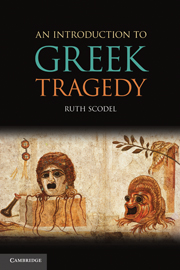1 - Defining Tragedy
Published online by Cambridge University Press: 05 June 2012
Summary
The very term “Greek tragedy” carries an immense weight of cultural and critical baggage. Even though the cultural prestige of the genre is often the inspiration for us to read, produce, or see these plays, this very prestige interferes with our ability to appreciate them. However, we cannot expect simply to shake off all the assumptions we have inherited about what a Greek tragedy is supposed to be. We would not want to, since we could not make sense of the texts at all without the scholarship of the past. Yet with that scholarship come inherited assumptions and expectations that distort. If we can at least identify some of these assumptions, even if we cannot see the plays in some pure, neutral way – for we will always see them or read them both through our beliefs about the ancient Greeks and about the genre, and through the concerns and presuppositions of our own place and time – we can at least see them more freshly.
There is one basic tension in any encounter with Greek tragedy that we should not even want to escape. These plays come from an ancient culture that is in some ways very distant from our own. Yet we expect them to move us and even to help us better understand our lives. If we rush too quickly to find universal meanings, we will probably ignore or misread whatever is profoundly different.
- Type
- Chapter
- Information
- An Introduction to Greek Tragedy , pp. 1 - 14Publisher: Cambridge University PressPrint publication year: 2010



